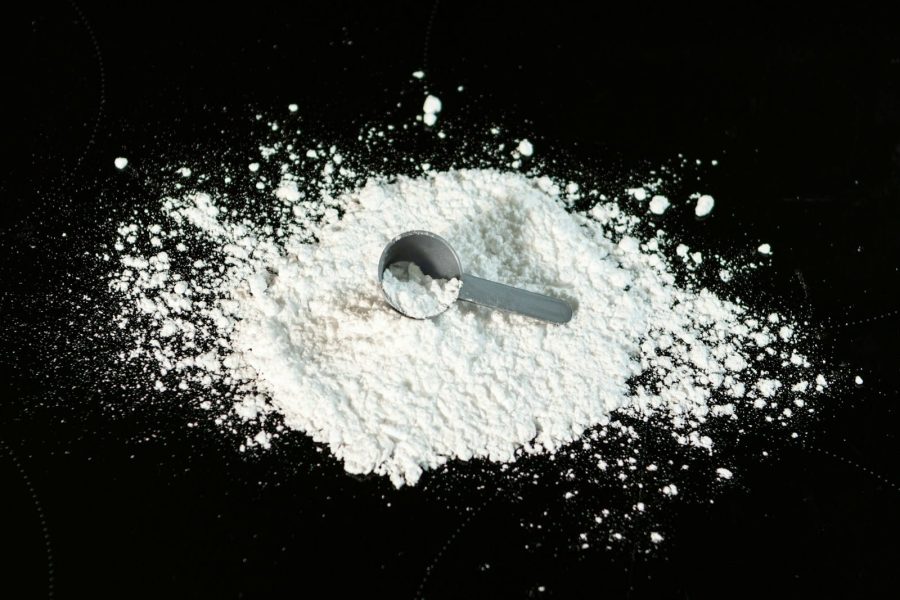Understanding Creatine
To get the most out of creatine monohydrate, it’s good to know what creatine is all about and how it does its thing in your body.
What is Creatine?
Creatine’s something your muscles and brain make and use. Mostly hanging out in your muscles, it’s made from amino acids like arginine, glycine, and methionine. You get a dose from foods like red meat and seafood, but your body pitches in about a gram a day too.
Creatine is like your body’s backstage pass for making energy during those high-octane moments, like when you’re pumping iron or sprinting away. It gets your muscles the fuel they need to boost your power and performance. That’s why athletes, gym buffs, older folks, and some vegetarians (who might not get enough from their meals) turn to creatine supplements.
For more on what creatine has to offer, check out our what is creatine page.
How Creatine Works
Creatine’s main gig is pumping up your body’s ATP (adenosine triphosphate) levels — the energy your cells run on. When you’re hitting it hard at the gym, ATP burns out quickly, usually in seconds. Creatine helps refill those energy reserves so you can keep firing on all cylinders for longer.
Here’s how creatine supercharges your workouts and helps pack on muscle:
- Boosts ATP: Creatine stores phosphates as phosphocreatine, which quickly turns back into ATP, the juice your muscles need for those heavy lifts or intense sprints.
- Builds Muscle: Taking creatine can help you bulk up with lean muscle.
- UPS Strength and Power: With more ATP, you can lift heavier and sprint faster, pushing your limits.
- Reduces Damage: Creatine helps repair muscle cells and eases inflammation after tough workouts.
- Keeps Muscles Hydrated: Creatine pulls water into muscle cells, keeping you hydrated and making your muscles pop.
Check out this handy table for a quick look at creatine’s perks:
| Benefit | How It Works |
|---|---|
| Boosts ATP | Quickly regenerates muscle energy |
| Builds Muscle | Helps increase lean mass |
| Increases Strength and Power | Enhances performance in intense activities |
| Lessens Muscle Damage | Aids cell repair and reduces inflammation |
| Enhances Hydration | Draws water into cells for fullness |
If you’re curious about how creatine ticks and its impact on your workout game, take a look at our deep dive how does creatine work.
Knowing the basics means you can better embrace the benefits of creatine monohydrate and work it into your fitness goals. Always weigh your dosing options, any safety concerns, and personal needs when using supplements.
To learn more about staying safe with creatine and what to watch out for, we’ve got you covered in our creatine side effects article.
Benefits of Creatine Supplementation
When you’re diving into creatine, you’re signing up for a ticket to some significant perks—think bulked-up muscles and sharper brainpower.
Muscle Mass and Strength
Creatine is your go-to buddy when you’re all about gaining muscle and strength. It helps muscles crank out the oomph they need, especially during those intense workouts (Healthline). If you’re lifting weights, creatine’s got your back in boosting that lean muscle.
| Benefit | What It Does for Muscle |
|---|---|
| Muscle Mass | Pumps up lean muscle |
| Strength | Adds more juice to muscle power |
Curious about how creatine supercharges muscle growth? Check out our article on creatine for muscle growth.
Exercise Performance Enhancement
Got an eye on upping your game with heavy lifting or hardcore workouts? Creatine’s your secret weapon. It’s like giving your muscles a little extra fuel, helping you bounce back quicker and hit those reps hard next time around.
| Exercise Type | Boost in Performance |
|---|---|
| Weightlifting | Bust out heavier lifts with ease |
| High-Intensity Interval Training (HIIT) | Go longer, stronger |
Want the full lowdown on how creatine props up your workout? Check out our benefits of creatine guide.
Blood Sugar Regulation
Creatine might just be a silent helper in keeping your blood sugar in check. By flexing those muscles and getting bigger, creatine helps your body make better use of glucose, which is great for health and might even stave off diabetes.
| Benefit | Effect on Blood Sugar |
|---|---|
| Glucose Utilization | Gets better with more muscle |
| Blood Sugar Levels | Lends a hand in regulation |
Dive deeper into how supplements like creatine can keep your blood sugar steady in our creatine side effects article.
Cognitive Function Improvement
You know creatine isn’t just about muscles, right? It’s got some brainy benefits, too, like boosting your memory and smarts. Just a couple of weeks on it and you could see a marked improvement, especially in older folks or vegetarians who can see a cool 20-50% hike in some test scores (Healthline).
| Cognitive Benefit | Changes Seen |
|---|---|
| Memory | Big gains in recall |
| Intelligence | Up by 20-50% for the veg heads |
Looking to boost cognitive health with creatine? Check out articles like creatine for women.
So, by getting to grips with creatine, you’re looking at gains all around—whether it’s muscle, workout power, blood sugar stability, or brain function. Go through our creatine dosage tips to get the most out of it.
Creatine for Specific Populations
Creatine monohydrate ain’t just some supplement in a pill bottle; it’s the gym buddy you never knew you needed. This stuff is like a Swiss Army knife for athletes, older folks, and those who skip the steak and go green.
Athletes and Fitness Enthusiasts
So you hit the gym like there’s no tomorrow? Creatine’s got your back by pumping up your muscle’s energy when you’re going heavy or fast. It’s like having a secret weapon for all the sets you want to crush. Amateurs or pros, plenty of athletic folks swear by creatine to lift heavier and recover quicker. This magic dust gives that “BAM” energy and strength boost without messing with your jogging game (Cleveland Clinic).
Some nerdy researchers say you’ll bulk up an extra couple of pounds in muscle when you stick with creatine for a few weeks (Cleveland Clinic). Want the full scoop on it? Pop over to our creatine loading phase article.
Older Adults
Who says you can’t teach old dogs new tricks? Older folks can totally dive into creatine too. In 2019, some smarty-pants figured out that this stuff beefs up muscle and packs a punch against slips and falls. It’s like turning back the clock a little on your muscles.
Trying creatine for the first time or looking to play it safe with the dosages? Sneak a peek at our handy guide on creatine dosage recommendations.
Vegetarians and Vegans
If you’re the ‘no thanks, I’m going meatless’ type, your body might not be getting enough creatine ‘cause it’s mostly in meat. But don’t fret, supplements have your back. Studies show creatine can swell those biceps even if you’re sticking to veggies when you’re lifting weights.
If you’re into pumping iron but don’t eat meat, a bit of creatine could be the boost you need for that extra oomph in your workout. Curious? Check out the tailored info just for you in our creatine for muscle growth write-up.
| Population | Key Benefits |
|---|---|
| Athletes and Fitness Enthusiasts | Quick energy, more strength, better performance |
| Older Adults | Better muscle mass, fewer falls |
| Vegetarians and Vegans | More muscle, more strength |
Knowing how creatine works differently for all sorts of people means you’re on track for some big gains. Before you shake hands with a new supplement, have a chat with a healthcare guru. And if you want to nerd out on more info, check out our guides on what is creatine and creatine side effects for even more juicy details.
Safety and Dosage Recommendations
Safety of Creatine Supplementation
Taking creatine supplements is usually safe if you follow the instructions. Lots of research backs up the safety for most folks. It’s particularly good at boosting muscle and helping you shine in quick, intense sports (Mount Sinai Health Library). Still, a chat with your doctor is smart before adding it to your diet due to the variety in supplement types and dosages.
| What To Do | Where It’s From |
|---|---|
| Check with your doc first | UCLA Health |
| Mostly safe at recommended amounts | Harvard Health Publishing |
Recommended Dosage
Creatine monohydrate is the go-to choice and the most researched form of creatine. You’re looking at taking about 3 to 5 grams a day. No need to overdo it—more doesn’t mean better and can burden your kidneys.
| Dosage | Amount (grams) |
|---|---|
| Daily Standard | 3-5 |
| Loading Phase (optional) | Larger initial amount over a few days |
For more on different dosing tricks, check out our guide on creatine dosage recommendations and details on the creatine loading phase.
Risks and Side Effects
Generally, creatine is a safe bet. Some folks might get an upset stomach, especially if taking too much.
| What Might Happen | Notes |
|---|---|
| Stomach troubles | Tied to big doses |
| Serious stuff (like kidney issues) | Rare, but too much can be harmful |
High amounts might bring about big side effects like kidney troubles and could mess with your body’s own creatine production. For the full scoop, see our piece on creatine side effects.
To get more clued up on creatine and what it does, have a look at our pieces on what is creatine and benefits of creatine.
Creatine Research Studies
Creatine monohydrate has been the star of a lot of scientific research, spotlighting its benefits across different groups of people. Dive into what studies reveal about its impact on your muscles, brain, and heart health.
Muscle Building Effects
Taking creatine supplements is like giving your muscles a little superpower boost. A 2022 review showed that creatine really amps up muscle mass and strength in healthy young adults. Plus, a 2019 review found it works wonders for older adults, helping them gain muscle and cut down the risk of falls. Even if you’re into lifting weights, creatine helps stack on lean body mass (UCLA Health).
| Study | Who was Studied | How Long? | Muscle Gain (kg) |
|---|---|---|---|
| Healthline Review (2022) | Young Folks | 6 Weeks | +2.0 |
| Healthline Review (2019) | Seniors | 12 Weeks | +1.8 |
| UCLA Health Study | Gym Buffs | 6 Weeks + 3 Weeks Off | +2.0 |
If you’re looking to boost muscle growth with creatine, check out our guide on creatine dosage recommendations and learn about the creatine loading phase.
Neurological Disease Benefits
There’s buzzing news that creatine might do wonders for brain health too. By upping phosphocreatine stores in muscles, you’re all set for more ATP energy during those intense activities—a trick that also brings potential protection against brain diseases.
Research into creatine’s influence on conditions like ALS and Parkinson’s is revealing how it offers a neurological safety net by increasing ATP and tamping down oxidative stress.
Heart Failure and Muscle Weakness
Creatine might be a secret weapon for those with heart troubles and muscle frailty. By bolstering the body’s creatine stash, ATP production gets a lift, upping physical performance and muscle function.
Take heart—those with heart failure who turned to creatine supplementation found their exercise endurance and muscle strength beating those who skipped the supps. This shines a light on creatine’s potential in giving a boost to both heart and muscle health when things aren’t working at full throttle.
| Issue | Improvement |
|---|---|
| Heart Trouble | More Stamina & Strength |
| Muscle Frailty | Better Muscle Performance |
You can discover more about the overall benefits of creatine and how it can fit snugly into different health and fitness strategies. If you’ve got a keen eye on muscle growth, our article on creatine for muscle growth digs deeper into the details.
Creatine’s backed by a solid pile of research, making it a tempting pick for various health goals. Just be sure to weigh the risks and side effects before diving in.
Creatine Market Overview
Peeking into the world of creatine helps you grasp why it’s a go-to choice for many. Whether you’re a gym junkie or a casual lifter, creatine’s got something for everyone. Let’s unwrap what makes creatine the buzz and how it rules the supplement shelves these days.
Popularity and Usage
It’s no surprise, creatine is a chart-topper in the supplement game. Loved by big-time athletes swishing for that edge, or gym rats chasing a personal best, creatine’s like the secret sauce for better workouts. Why? It boosts the fuel your muscles need during intense exercises – think of it like giving your body’s battery an extra charge as you strive for new heights.
Market Value in the US
Stateside, folks spend about $14 million a year on creatine supplements. That’s a hefty pile of cash showing just how much trust and demand there is for this stuff. When it comes to packing on lean muscle or ramping up your gym performance, the numbers speak for themselves.
| Metric | Value |
|---|---|
| Market Value (US) | $14 million annually |
| Primary Use | Muscle Mass & Performance Enhancement |
Competition and Effectiveness
Even with all the supplements out there promising you’ll look like a superhero, creatine holds its ground. Loads of studies back its claims – add creatine to resistance training, and you’ll likely see boosts in performance and a chisel to those biceps (PMC).
Yet, it’s not only about bulging muscles. Creatine gets a thumbs up for tackling muscle weakness due to things like heart issues and muscular dystrophy, demonstrating its broader reach in helping folks power up when needed.
Feel free to click around our site for more on the perks of creatine, or how it juices up muscle growth and gears you up for sport stardom. Stay savvy with details on risks and side effects and get the lowdown with recommended dosages to keep your supplement plan safe and spot on.










